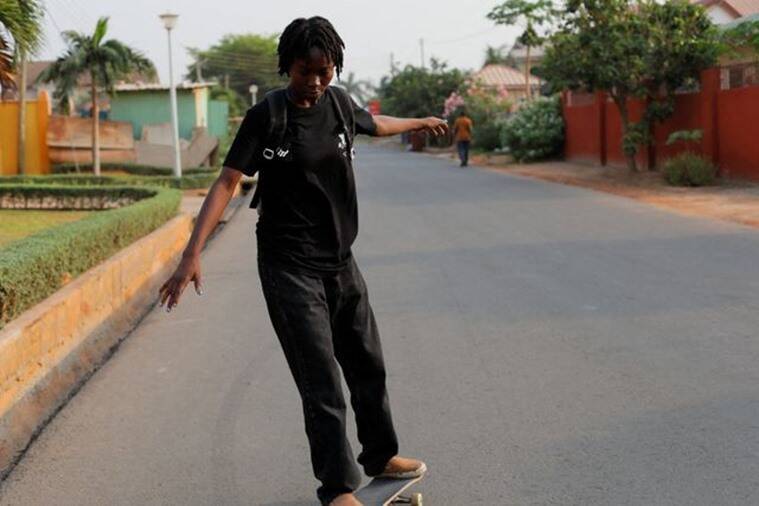As dawn broke behind her, Harmonie Bataka skated in wide curves down a suburban street on the outskirts of Ghana’s capital, Accra, empty but for a scattering of people going to church.
Sundays used to be the only time 27-year-old Bataka could skateboard, when the streets were quiet and she didn’t have to work. That was before she quit her job last year to pursue the sport full time, to the dismay of friends and family.
“They said there were too many boys doing it, boys who were too good for me to win any competitions… but I didn’t care,” said Bataka, sheltering from the sun in the shade of a half-finished building.
“I just wanted to be free to do what I love,” she added. “It is really necessary and really important, otherwise this world will break you.”
Skateboarding is a fringe sport in West Africa, especially for girls. Less than 17% of the world’s weekly skateboarders were women in 2018, according to data from Grand View Research.
Bataka didn’t know any other female skaters when she started, but today she is at the centre of a thriving scene, thanks in part to Ghana’s first skatepark which opened late last year. Now she teaches her passion to women and girls full-time.
Through the “Skate Gal Club” founded by a local extreme sports collective, Bataka found a tight circle of women who supported each other in ways that went beyond skateboarding – sharing recipes, gardening tips, mental health advice and more.
That connection cemented her desire to reorient her life around the sport.
“I truly felt comfortable,” Bataka said. “That’s what Skate Gal Club is all about.”
Skateboarding is one of the world’s fastest-growing sports, but its popularity in Africa has yet to catch up with global trends. There are only a few skateparks on the continent, and only three of the 80 skateboarders competing in Tokyo’s 2020 Olympic games, the first to include the sport, were African.
Ghana’s 500-square-metre “Freedom Skatepark” was completed in December with support from Wonders Around the World, an NGO that builds skateparks in developing countries, and the late Louis Vuitton designer Virgil Abloh, whose parents were Ghanaian immigrants.
 Harmonie Bataka, 27, a skateboarder and skateboarding tutor, practises skateboarding on streets in her neighbourhood in Tema, Ghana (Source: Reuters)
Harmonie Bataka, 27, a skateboarder and skateboarding tutor, practises skateboarding on streets in her neighbourhood in Tema, Ghana (Source: Reuters)
Concrete Ramps
Its concrete ramps draw an increasing number of skaters each week. They can rent boards and safety equipment or book private instruction from someone like Bataka.
The Skate Gal Club has also ballooned and every Thursday the park is open exclusively to women and girls, who can use the equipment and take lessons for free.
These female-only days have been particularly impactful for new skaters like four-year-old Leila, one of Bataka’s youngest students.
Leila has already conquered one of the park’s largest ramps and her mother Myriam said it has been important for her to see girls doing the sport.
“It’s just so good to have a place for the girls to take examples from each other,” Myriam said. “She told me last time, ‘Oh, as a girl can I do this?’ … And I said ‘Yes Leila, you can do anything’.”
Bataka hopes the female-only sessions will encourage more Ghanaian women to try skateboarding. The lessons she’s learned about courage and perseverance are priceless.
“You just need to kill the fear,” Bataka said. “Once you fall, you already have a feel for the worst thing that could happen… You keep going just because you want to get better.”
Bataka carried that mentality as she carved through her neighbourhood on her day off. A wide-eyed boy watched from behind a fence as she did a trick move off a curb in which her feet and the board left the ground together and a smiling couple looked on from a storefront.
When a mother in yoga pants crossed her lawn to tell Bataka how impressed she was with her skating, Bataka beamed from ear to ear and pointed her in the direction of Freedom Skatepark.
📣 For more lifestyle news, follow us on Instagram | Twitter | Facebook and don’t miss out on the latest updates!
